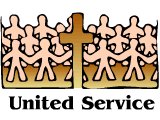|
BACKGROUND
CALL
CALL, CALLING
MINISTER
MINISTER
MINISTRY
|
Online links to scriptures (New International Version [NIV] unless otherwise stated) are shown in blue
| THE POWER OF THE CALL |
|
 Today there are millions of people involved in Christian ministry around the world. Some work fulltime, others in combination with other employment. Some are paid a living wage, while others receive no monetary remuneration at all. Today there are millions of people involved in Christian ministry around the world. Some work fulltime, others in combination with other employment. Some are paid a living wage, while others receive no monetary remuneration at all.
So what motivates people into ministry?
This question has many individual answers. It includes those seeking to please God, those wanting to help others, through to, at the other end of the scale, those who see it as a way to make a living, or perhaps, do not know what else to do with their lives.
Upon observation and from reading history, there seems to be a pattern to church leadership. New movements that start up under the inspiration of the Holy Spirit are led by those who are 100% sold out to God and fully committed to what He is doing, irrespective of the cost to themselves. As these 'pioneers' are succeeded by those who are followers of the vision, there soon comes a greater formalisation of leadership in which structure, theology, learning and qualifications assume greater roles. Until you reach the situation where no-one can be appointed to a leadership role unless and until they have requisite qualifications recognised by the group concerned. At this time the leadership of the Holy Spirit is replaced by regulations, authority structure and appointment patterns devised and operated by humans, done of course, in the name of God. As God goes, theology and qualifications fill the void and take His place.
But what does the New Testament say about the appointment of leaders? The primary verse is found in Ephesians:
Ephesians 4:11
|
|
|
 In the initial stages of a movement, the people, most of whom are rejected by the established church and, most likely, by society as well, are trained by an enthusiastic, committed leadership operating informally on a similar level as the people, with little or no financial reward, to do the work. In the initial stages of a movement, the people, most of whom are rejected by the established church and, most likely, by society as well, are trained by an enthusiastic, committed leadership operating informally on a similar level as the people, with little or no financial reward, to do the work.
However, as the movement grows, leadership attains status, and formally or informally, reverts back towards the intermediary or priestly system of the Old Testament, where they, as paid professionals, are expected to do the work on the people's behalf. This arrangement generally suits both leaders and led, but it is not, as we can see above, biblically correct.
Leaders are to be called by God, not appointed by man.
How do we know then, who is called by God?
|
|
|
 Firstly, from the leaders perspective. A leader must receive a clear call on his or her life from God. Firstly, from the leaders perspective. A leader must receive a clear call on his or her life from God.
For me, I was working in my flower fields when God, minding my own (or the flowers) business, when the audible voice of God clearly called me into ministry. He clearly explained what the thrust of the ministry was to be. Unlike the fishermen disciples of the New Testament, I didn't have family to take over my role in the business, so I worked half a day, and spent half a day in ministry.
A few years later, God asked me to go into ministry full time. As proof, He said He would bring a buyer along for the business within a month. He did so on the very last day!
As a lifelong businessman, I tried to organise to provide financially for myself and my family. This, to cut a long story short, ended up in bankruptcy! Then, and now, I became dependent upon Him for ministry funding, and as hard for me, upon my wife Kathy, for day to day living expenses.
Over the past 10 years the 'opportunity cost' (an economists term, for I am a trained economist) of being in ministry as opposed to running businesses is in the million plus range of dollars. We now live in a rented home, owning only our household effects.
We operate in this way because of the power of the call on my/our life/lives. It is not a job, it is a call. Financially it is hugely costly, but the motivation is not financial. It was, and is, simply an act of obedience. Had I/we not been obedient I would have regretted it for the rest of my life.
Those who are truly called will be prepared to pay the necessary price. A call is not a comfortable job. Just ask Paul!
2 Corinthians 11:23-5
|
|
|
Leadership is a call, costing all, not a profession.
|
|
|
 Christian leadership is difficult, as all involved in it well know. The pressures and expectations that come with the job can be overwhelming. Burnt out leaders are sadly, a common phenomenon. Why is this? Surely it is not of God? For God would not design a system where His leaders would suffer not for Him (which we are all called to do as part of the process of maturity) but from the unreasonable angst and expectations of those one is leading. Christian leadership is difficult, as all involved in it well know. The pressures and expectations that come with the job can be overwhelming. Burnt out leaders are sadly, a common phenomenon. Why is this? Surely it is not of God? For God would not design a system where His leaders would suffer not for Him (which we are all called to do as part of the process of maturity) but from the unreasonable angst and expectations of those one is leading.
When Jesus came with the New Covenant, the former priestly system where the priest was an intermediary between people and God, came to an end. Jesus alone is to be our mediator. Unfortunately however, neither the majority of leaders nor the led have understood this principle. For the priestly system has apparent advantages for both.
For leaders, there is power and status, for the led an abrogation of their personal 'religious responsibility' to the priest, pastor, or whatever title is given.
Who suffers? Both suffer!
Leaders wrongly take on people's burdens while the people miss out on the benefits (and responsibilities) which a true personal relationship with Jesus brings.
|
|
|
 Who suffers? Both suffer! Who suffers? Both suffer!
Leaders wrongly take on people's burdens while the people miss out on the benefits (and responsibilities) which a true personal relationship with Jesus brings.
Why does this situation exist?
Because leadership has become separated (superior) from the led through the professionalisation of the ministry. The principle of 'the power of the call' has been lost.
Call, as we saw last week, involves sacrifice.
Listen to Corrie Ten Boon (pictured) talking about her sister Betsy.
Betsy and I, in the concentration camp, prayed that God would heal Betsy who was so weak and sick. "Yes, the Lord will heal me,", Betsy said with confidence. She died the next day and I could not understand it. They laid her thin body on the concrete floor along with all the other corpses of the women who died that day.
It was hard for me to understand, to believe that God had a purpose for all that. Yet because of Betsy's death, today I am traveling all over the world telling people about Jesus.
|
|
|
 When we look through history, all the great movements of God have been led by people prepared to pay the price of giving up on self, of rejection by the religious and civil establishments of the day and often, have paid for their conviction and revelation with their life. When we look through history, all the great movements of God have been led by people prepared to pay the price of giving up on self, of rejection by the religious and civil establishments of the day and often, have paid for their conviction and revelation with their life.
Why is the church growing so fast in much of Asia and parts of Africa today? Primarily because leaders are prepared to pay the price of the call on their lives. They have no position in society, little or no income, are persecuted, beaten, imprisoned and even killed. No buildings, no sound systems, no programmes, yet people are finding Jesus in droves.
Almost sounds like the original disciples! History tells us that all were martyred for their faith with the exception of John, who was boiled in oil but survived to enjoy 'the pleasures' of the prison island of Patmos, where he received the revelation of Revelation!
|
|
|
 Here in New Zealand, in the 1950s, there was a Spirit based move of God that saw many come to Jesus. It was led by ordinary people, enthusiasts inspired by and full of the Holy Spirit. They sacrificed their careers, living on the 'smell of an oily rag', to spread the 'Good News' of Jesus. Here in New Zealand, in the 1950s, there was a Spirit based move of God that saw many come to Jesus. It was led by ordinary people, enthusiasts inspired by and full of the Holy Spirit. They sacrificed their careers, living on the 'smell of an oily rag', to spread the 'Good News' of Jesus.
The movement grew. A Bible School was set up. Pastors appointed. Buildings were purchased. Programmes were put in place. A formal organisation with 'spiritual oversight' was formed. Another denomination with values and beliefs, charters and rules, was formed. And today, the Spirit has largely gone and it is dying both spiritually and numerically.
Speaking to those who remain of the leaders from the early days, most regret the course things have taken, but very few have been prepared to leave the comforts the system now provides in order to return to the principles of their original call.
My friend, I do understand the attraction of security that the formal church brings. I do know that we all have to 'pay the bills'. Yet we are also called to live by faith. To give God the opportunity to live and witness through us, rather than us to simply talk about Jesus from a professional position of relative comfort and security.
Hebrews 10:32-9
|
|
|
 I would like to finish today with the story of a man in the city of Napier from my youth. Jack was a watersider. He worked on the wharves. Amazingly, in that generally hostile, union based environment, he was a dedicated follower of Jesus. He had no formal education, no Bible training, no position in society. Yet he had the power of the call of a teacher on his life. He led a Bible study group of 50 grown men from all walks of life. To get such numbers on an ongoing basis was unbelievable in the context of men in our city. He received a lot of flack from the establishment. Yet he was obedient and effective in the Lord's ministry through him. I would like to finish today with the story of a man in the city of Napier from my youth. Jack was a watersider. He worked on the wharves. Amazingly, in that generally hostile, union based environment, he was a dedicated follower of Jesus. He had no formal education, no Bible training, no position in society. Yet he had the power of the call of a teacher on his life. He led a Bible study group of 50 grown men from all walks of life. To get such numbers on an ongoing basis was unbelievable in the context of men in our city. He received a lot of flack from the establishment. Yet he was obedient and effective in the Lord's ministry through him.
Are you living out your call?
|
|
|
Call comes with sacrifice, not a salary!
|
| <i>NEXT WEEK:</i> RELATIONSHIP V THEOLOGY - THE POWER OF THE CALL |
|
 We look at leadership from the perspective of the people. We look at leadership from the perspective of the people.
|
| A NOTE FROM DAVID |
|
 The changing of leadership in the church, which happened relatively early on in the church's history, from a calling to a profession, has had a profound influence on the form of the church we have today. The changing of leadership in the church, which happened relatively early on in the church's history, from a calling to a profession, has had a profound influence on the form of the church we have today.
We need to return to our roots found in the New Testament, in order to breathe life and vitality back into a formalised church system.
JESUS: BACKGROUND
Historical Overview
Rome - Domestic Life The family was a strong social unit in Roman civilization. In early centuries, the head of the family (paterfamilias) exercised total control over the whole family. Children were taught to respect the gods, their country, and their parents, in that order. By Julius Caesar's time, Roman women could own property and even influence politics. Girls and boys were educated, and some women received a higher education.
|
So until next week.......
MAY GOD BLESS YOU AND YOU BLESS GOD!
His servant and yours

Learn more about us at...
www.wwj.org.nz/about.php
|
A DAVID'S DOODLING
160. In God, if you’re not led to lead, you’ll be bled to death.
David Tait
|
Check
out the WWJ website for….
More David's Doodlings: www.wwj.org.nz/dd.php
Life's a Laugh: http://www.wwj.org.nz/lifelaugh.php
Links to other sites of interest: http://www.wwj.org.nz/links.php
Till Death do us Part!: http://www.wwj.org.nz/tddup.php
Pets Rule!: http://www.wwj.org.nz/pets.php
|

 Today there are millions of people involved in Christian ministry around the world. Some work fulltime, others in combination with other employment. Some are paid a living wage, while others receive no monetary remuneration at all.
Today there are millions of people involved in Christian ministry around the world. Some work fulltime, others in combination with other employment. Some are paid a living wage, while others receive no monetary remuneration at all.  Their role is to be:
Their role is to be:  In the initial stages of a movement, the people, most of whom are rejected by the established church and, most likely, by society as well, are trained by an enthusiastic, committed leadership operating informally on a similar level as the people, with little or no financial reward, to do the work.
In the initial stages of a movement, the people, most of whom are rejected by the established church and, most likely, by society as well, are trained by an enthusiastic, committed leadership operating informally on a similar level as the people, with little or no financial reward, to do the work.  Firstly, from the leaders perspective. A leader must receive a clear call on his or her life from God.
Firstly, from the leaders perspective. A leader must receive a clear call on his or her life from God.  Christian leadership is difficult, as all involved in it well know. The pressures and expectations that come with the job can be overwhelming. Burnt out leaders are sadly, a common phenomenon. Why is this? Surely it is not of God? For God would not design a system where His leaders would suffer not for Him (which we are all called to do as part of the process of maturity) but from the unreasonable angst and expectations of those one is leading.
Christian leadership is difficult, as all involved in it well know. The pressures and expectations that come with the job can be overwhelming. Burnt out leaders are sadly, a common phenomenon. Why is this? Surely it is not of God? For God would not design a system where His leaders would suffer not for Him (which we are all called to do as part of the process of maturity) but from the unreasonable angst and expectations of those one is leading.  Who suffers? Both suffer!
Who suffers? Both suffer! When we look through history, all the great movements of God have been led by people prepared to pay the price of giving up on self, of rejection by the religious and civil establishments of the day and often, have paid for their conviction and revelation with their life.
When we look through history, all the great movements of God have been led by people prepared to pay the price of giving up on self, of rejection by the religious and civil establishments of the day and often, have paid for their conviction and revelation with their life.  Here in New Zealand, in the 1950s, there was a Spirit based move of God that saw many come to Jesus. It was led by ordinary people, enthusiasts inspired by and full of the Holy Spirit. They sacrificed their careers, living on the 'smell of an oily rag', to spread the 'Good News' of Jesus.
Here in New Zealand, in the 1950s, there was a Spirit based move of God that saw many come to Jesus. It was led by ordinary people, enthusiasts inspired by and full of the Holy Spirit. They sacrificed their careers, living on the 'smell of an oily rag', to spread the 'Good News' of Jesus.  I would like to finish today with the story of a man in the city of Napier from my youth. Jack was a watersider. He worked on the wharves. Amazingly, in that generally hostile, union based environment, he was a dedicated follower of Jesus. He had no formal education, no Bible training, no position in society. Yet he had the power of the call of a teacher on his life. He led a Bible study group of 50 grown men from all walks of life. To get such numbers on an ongoing basis was unbelievable in the context of men in our city. He received a lot of flack from the establishment. Yet he was obedient and effective in the Lord's ministry through him.
I would like to finish today with the story of a man in the city of Napier from my youth. Jack was a watersider. He worked on the wharves. Amazingly, in that generally hostile, union based environment, he was a dedicated follower of Jesus. He had no formal education, no Bible training, no position in society. Yet he had the power of the call of a teacher on his life. He led a Bible study group of 50 grown men from all walks of life. To get such numbers on an ongoing basis was unbelievable in the context of men in our city. He received a lot of flack from the establishment. Yet he was obedient and effective in the Lord's ministry through him. We look at leadership from the perspective of the people.
We look at leadership from the perspective of the people.  The changing of leadership in the church, which happened relatively early on in the church's history, from a calling to a profession, has had a profound influence on the form of the church we have today.
The changing of leadership in the church, which happened relatively early on in the church's history, from a calling to a profession, has had a profound influence on the form of the church we have today. 